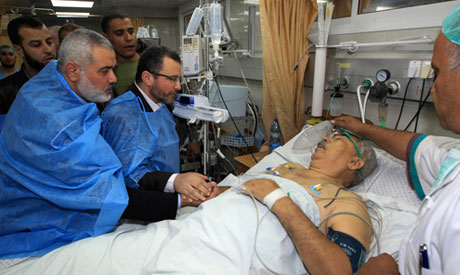
Gaza's Hamas Prime Minister Ismail Haniyeh, left, and Egyptian Prime Minister Hesham Kandil, second left, visit a man wounded in an Israeli strike, at the hospital in Gaza City, Friday, Nov. 16, 2012 (Photo: Reuters)
Egyptian Prime Minister Hisham Qandil arrived in Gaza on Friday morning to show solidarity with the besieged coastal enclave, currently under heavy Israeli bombardment.
The planned hours-long visit, according to informed sources, has already been contested by Israel, which does not appear set to backdown – despite numerous appeals to Tel Aviv by several world capitals to avoid military escalation.
In Gaza, Qandil voiced unconditional Egyptian support for the Palestinians, but he will also, according to sources involved in preparing his trip, avoid escalatory language.
In Gaza, Qandil vowed to intensify Cairo's efforts to secure a truce and end Israel's "aggression".
"Egypt will not hesitate to intensify its efforts and make sacrifices to stop this aggression and achieve a lasting truce," he said at a press conference in Gaza City's Shifa hospital after seeing some victims from the latest strike.
"Egypt is not planning to get the Palestinians to escalate; we are supporting them, but we don't want them to escalate," said one officialto Ahram Online. "On the contrary, we want a truce as soon as possible."
"He will certainly talk about sparing Palestinian people from the attack and acting to stop the bloodshed," said the same source. "The bottom line is that we want this aggression to stop; it's not in the interest of anyone to keep it going; Gaza is already in a very bad shape."
In late 2008 and early 2009, Israel launched a massive operation against Gaza. The destruction sustained by an already impoverished and poorly equipped Gaza Strip was never repaired, given the harsh siege imposed by Israel on the territory since it was taken over by Palestinian resistance movement Hamas in 2007.
Today, it seems that more destruction and bloodshed are looming over the strip's roughly 1.7 million besieged residents. The Israeli aggression that began on Wednesday evening and has been escalating ever since – a nightmarish reminder of the 2008-2009 'Operation Cast Lead' – is expected to continue for at least a few days, according to Egyptian and Western sources who spoke to Ahram Online.
While most sources ruled out the likelihood of a three-week operation on the basis that the government of Israeli Prime Minister Benyamin Netanyahu cannot maintain the current aggression that long while Tel Aviv is being hit by rockets launched from Gaza, many anticipate a few days "at least" before the operation grinds to a halt.
"With or without a ground operation – although I think a limited ground operation highly likely – Israel could keep this going for about a week," said one Western diplomat.
To judge by the reluctance expressed by most, if not all, of the five permanent members of the UN Security Council to call for an end to hostilities over the past 48 hours – and condemning Israel seems to be out of the question – it appears that key world capitals are willing to give Israel at least a few days to do what it wants.
Egyptis sending humanitarian materials to Gaza and will use the Rafah Border Crossing to allow other countries’ humanitarian aid to enter the Gaza Strip.
Arab diplomatic missions in New York, meanwhile, are continuing to lobby for an end to the attack.
"We aren't sure how it will end, but if you can't get the UN Security Council to agree on a statement calling for an end to hostilities, it's hard to see it issuing a resolution demanding that the attack be halted," said one New York-based Arab diplomat.
The international community endured two weeks of Israel's deadly 2008/09 Operation Cast Lead, during which some 1500 mostly civilian Palestinians were killed and thousands more injured, before it began working on a draft resolution – and even this was not immediately implemented.
But – given recent dramatic changes in the Middle East – 2012 is not 2009, as Western diplomats acknowledge: the anti-Hamas regime of Hosni Mubarak has been replaced with a Muslim Brotherhood presidency keen to show the public that it is different from the ousted regime, while the ongoing crisis in next-door Syria has left little room for missteps in the volatile region.
At a meeting scheduled for Saturday at the Arab League's Cairo headquarters, Arab states will condemn the Israeli aggression and call upon the international community to act to stop it. Words of praise for Egypt's speedy decision to withdraw its ambassador from Tel Aviv will likely be made, coupled with carefully worded threats of diplomatic – maybe even economic – retaliation.
"But realistically speaking, none of this will stop Netanyahu if he decides it is in his best interest to keep the war going," said one Arab diplomat. "Short of firm American pressure or considerations on his home-front, nothing will stop Netanyahu – especially if he manages to achieve some of his objectives on the ground without paying a serious price back home."
Arab diplomats lament the fact that the higher the death toll in Gaza the easier it will be to persuade the international community to pressure Israel to stop and to convince Hamas, along with other Palestinian factions, to agree to an immediate ceasefire and negotiate an agreement to maintain that ceasefire.
Egypthad already tried – unsuccessfully – to mediate a deal aimed at preventing the current aggression.
Short link: